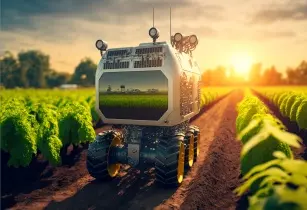Economists and experts in technological innovation on 3 July, discussed medium-term scenarios held at the FederUnacoma General meeting in Palazzo Varignana, Italy
The economic crises of recent years, brought about by unpredictable events such as the pandemic, global inflation and the war in Ukraine, have severely tested production systems and reduced the ability of companies to plan economic activities. The only way for them to react to uncertainty is to intensify their analysis of the socio-political and economic variables influencing the markets, and seize the opportunities offered by the most advanced technological innovations. This is the scenario that FederUnacoma president Alessandro Malavolti laid out at the opening of the meeting on 'Beyond the economic situation: planning activities, planning investments.'
On the agricultural front, the growth in demand for foodstuffs is driven by increased demographic pressure and changing lifestyles. In his report, Angelo Frascarelli, professor at the University of Perugia said, "World consumption of soft wheat has grown by 22% since 2010, while overall cereal consumption has grown by 31%. The climate crisis, the cost of energy, the difficulty of finding inputs for production, price volatility and the problem of labour are, however, variables that weigh on the productivity of agriculture and its ability to respond to the growing demand for foodstuffs."
It was emphasised at the conference that the transformation of the primary sector is an ongoing process. "In just a few decades, machine performance has improved significantly and electronics have become dominant. Considerable improvements have also been made on the engine and consumption front, and on the digitisation of equipment, tractors and combine harvesters," said the Rector of the University of Bologna, Giovanni Molari, adding that apps and smart systems were now being used by more than 70% of farms in Italy. In this perspective, universities and research centres are called upon to play a strategic role, not only to boost technologies but also to train young farmers in the use of 4.0 systems.
In the agromechanical sector, the new technological frontier is that of highly automated systems, which are already being used to perform a wide range of agricultural tasks. Agricultural robots, including self-driving tractors, are mainly used for sowing, pesticide treatments, harvesting, and soil monitoring and mapping. "These machines are equipped with highly sophisticated digital systems, such as LiDAR sensors and high-resolution RGB cameras, which allow them to acquire information from the environment, process it, and use it for production purposes," explained Marko Bertogna, professor at the University of Modena and Reggio Emilia. He also pointed out that although robotic technologies had undergone significant developmentin recent years, they still had significant margins for improvement.





